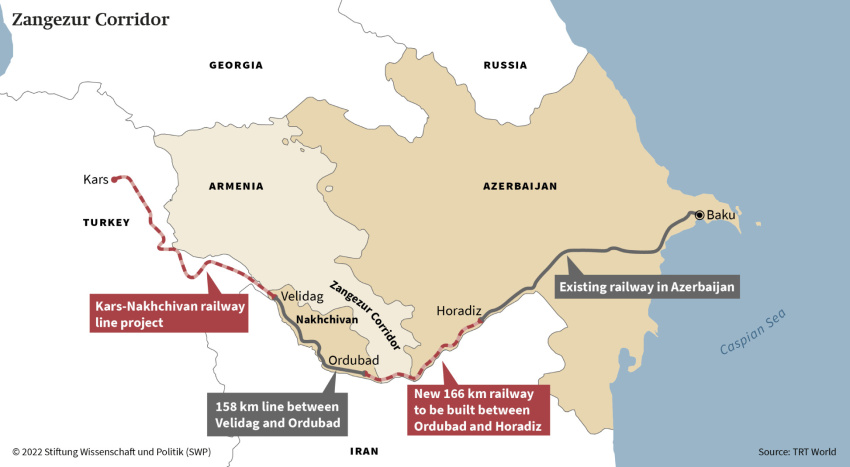Iran's Other Options Toward the South Caucasus Corridor

The so-called Zangezur Corridor has now received a major uplift as a realistic transportation project, linking Azerbaijan to the Nakhichevan enclave through Armenia in Iran's vicinity, by the recent signing of a US-brokered peace agreement between Armenia and Azerbaijan. Dubbed as the "Trump Route For International Peace and Prosperity," the announcement from the White House has received a lukewarm response from Moscow, which is set to negotiate directly with the US President on Ukraine, in contrast to Tehran's sharp rebuke. Warning that this will turn into the "graveyard" for "Trump's mercenaries," Mr. Ali Akbar Velayati, who is advisor to the Supreme Leader, has led the chorus of official voices, whose main concern is, of course, the negative ramifications for Iran's vested interests.
There is, of course, no shortage of analyses in Iran and abroad describing the Zangezur Corridor, or whatever the new vernacular for the 20 plus mile strategic project linking the South Caucasus to Turkey and Europe, bypassing Iran, as fundamentally inimical to Iran's interests, which, in turn, has resulted in Iran going as far as staging a major military exercise near the Armenian border in order to send the message that it will not tolerate it.
But, the question needs to be asked: can Iran realistically play the spoiler role and prevent this "corridor?" After all, it passes through Armenia and if the Yerevan leaders, losing hope in Russia and seeking greater integration with the West, have consented to it, then it is difficult for Iran to act as champion of Armenia's "territorial integrity" when the Armenian themselves seem resigned to it.
Another big question is: Is this really a "zero-sum" game or situation that will bear only negative results for Iran and its ambitions to act a regional transportation hub for China and the landlocked Central Asian states? Although many analysts in Iran think so, this need not be the case and there are other options that Iran needs to entertain, such as how to insert itself in the project and "share the dividend" of a major international transportation route in its vicinity? Thus, instead of the stick of threats and warning that it will do whatever to make the project impossible, Iran can weigh in to condition its acceptance by infusing sub-projects, including a rail connection as well as pipeline connection, that would, in turn, make Iran into a stakeholder in the project, this means that the unreconstructed Velayati-led objections require certain creative revisions in order to advance Iran's regional interests. Another problem with the proposed corridor is that it conveys the impression of an exclusive use by certain parties, which does not seem to be replicated in the latest plan unveiled at the White House. If, indeed, that is the case, then that undermines the Iranian objection that the proposed corridor cuts its access to Armenia and the broader South Caucasus, or that it spells the end of China's transportation interest in Iran, i.e., both an exaggeration born of geo-economics naiveté. Such delicate and important developments must be taken into consideration by Tehran, hitherto missing due to a paranoid reaction that is a staple of the fixed ideas in Iran's foreign policy, in dire need of a major house cleaning. Unfortunately, the old habits die hard, irrespective of the exorbitant prices paid by Iran, e.g., obsessions with the out of area Israel when the policy-makers should have concentrated on Iran's neighbors and near-neighbors. The continuation of the old cognitive map on foreign policy in Iran has been rather disastrous as of late, and the sooner the country re-tracks itself on a healthier footing bereft of dogma impairing the national interest lens, the better. The fact of the matter is that with Moscow likely on board this project in the proximate future, Iran will be the odd man out and it can only harm its own interests by sticking to an untenable position vis-a-vis what appears to be a fait accompli. Instead, Iran should as stated above use its potential spoiler role for a direct involvement in the proposed international project, even to the point of joining the consortium.

